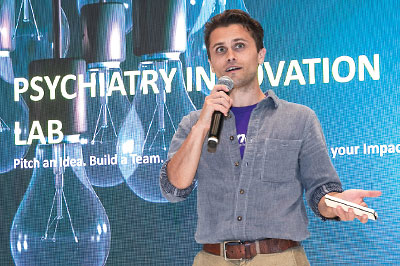2018 Innovation Lab Alum Turns Idea Into Reality
Abstract
The gradual but sustained progress of the Cognova dementia app showcases how APA’s “Shark Tank”–style event provides long-term benefits and guidance for budding entrepreneurs.

At APA’s Annual Meeting in May, Sean Christensen, M.D., a psychiatry resident at the Medical University of South Carolina (MUSC), received the 2019 Innovation Lab Alumni Award for his Cognova app. This award is given to the project that has made the most progress since the previous year’s Innovation Lab.
As Christensen explained during his acceptance speech, the feedback and support he received at last year’s event was crucial in transforming Cognova from a nascent concept into a working product.
Cognova is a mobile app that uses adaptive reminiscence therapy to help improve the quality of life for adults with dementia. The Cognova platform connects patients with a large library of multimedia (photos, music, videos). The initial library is based on the patient’s demographic information, but as patients “like” media that they find enjoyable or memorable, an algorithm adapts the library content to become more personalized.

At APA’s 2019 Innovation Lab, Cognova co-developer Sean Christensen, M.D., thanked the organizers and judges for fostering an environment that helps mental health innovators reach their goals.
Reminiscence therapy not only reduces agitation and distress in patients but also benefits family and friends. Caregivers receive reports from Cognova on what the patient has enjoyed viewing, which they can use to start conversations and deepen emotional connections.
Christensen first learned about the value of reminiscence therapy while working with geriatrics professor Victor Hirth, M.D., at the University of South Carolina School of Medicine. “He mentioned the immense potential of helping patients recover some meaningful memories, and I saw some of that firsthand as well,” Christensen told Psychiatric News.
Together their team developed some concepts for an online-based reminiscence program that anyone could use, though initially it was more a creative exercise. “But after I participated as one of the thought leaders [the volunteers who help finalists revise and hone their pitches] at the 2017 APA Innovation Lab in San Diego, I thought, ‘We should run with this idea.’”
Christensen had just started his residency at nearby MUSC, which enabled him to continue to collaborate with Hirth and develop a broad model of Cognova, which they pitched together at the 2018 Innovation Lab.
Their concept was lauded. Cognova received the Impact Award, which recognized the app’s potential to help millions of older adults and their families. But it was the critique that Christensen appreciated the most and helped steer the project closer to completion.
First, the judges suggested that instead of focusing solely on popular mass media, he should consider developing a cultural repository. This meant media related to specific spiritual, ethnic, or regional backgrounds. Though such items might be a little harder to acquire, they could be very emotionally powerful.
A second critical suggestion was to consider media groups as partners. The initial design for Cognova involved scouring existing online media collections like YouTube. But working directly with companies could increase access to material and avoid potential copyright concerns.
“We incorporated all that feedback, started working with our software developer, and got a minimally viable product [a barebones model] done by last September,” Christensen said, adding that he is currently pilot testing the app at two geriatric centers in South Carolina. He also established a small advisory council to provide further expertise in outreach, marketing, and dementia care.
“It’s been a gradual process, but it just comes with the intensity of the task of finding media that is going to be relevant to patients,” Christensen said.
Even as he builds Cognova’s media collection, Christensen is already thinking ahead. “One of our team’s big goals is to branch out beyond reminiscence and really expand the caregiver portion of the program.” He is hoping to add a host of new tools and assessments that caregivers can use to engage with patients, which may help lower the caregiver’s emotional burden.
Christensen is also looking forward to APA’s next Innovation Zone. “For anyone else interested in developing something, this part of the APA meeting is a must,” he said. “Not only is it an open and inviting atmosphere, but you are surrounded by experts who you might never get in the same room together on your own.” ■
More information about Cognova is posted here.



